- Home
- Madeleine L'engle
Certain Women Page 13
Certain Women Read online
Page 13
We bear what we have to bear. Alice had told her that, and she knew it was true.
It was morning, and Emma and Alice sat out on the loading platform of the Portia, or what Bahama had called the back porch, sipping coffee. Alice had bathed David and given him breakfast. Ben was puttering about in the engine room before pulling up anchor.
“I’ll go fishing this morning.” Alice absently swirled the last of the coffee in her mug and put it down on the wide shelf she and Ben used for cleaning fish and other messy chores. A hose was coiled near her feet. “A red snapper would be good. Finish your coffee, Em. It’s time we got moving if we’re going to get to Bella Bella to meet Abby.”
Something in Alice’s tone made Emma ask, “Are you nervous?”
“A bit. Yes.”
“Don’t be. Abby’s pure gold.”
Alice laughed a little sadly. “Surely it isn’t usual for ex-wives to come visit present wives.”
“Nowadays it’s not that uncommon. But I suppose not many ex-wives are godmothers to their stepdaughters. Abby’s been marvelous to me, all my life. She’s nearly eighty, though she doesn’t look it or seem it. She’s done a lot of living and she’s learned a lot and she’s willing to share. She’s wise, and she’s forbearing, and I love her.”
“I hope she’ll approve of me.”
“Alice! She’ll think you’re wonderful. She’ll be as grateful as I am for all you’re doing for Papa.”
Alice was sharp. “I don’t want gratitude.”
“I’m sorry. Abby’ll love you, as I do, and not because of Papa, but for you yourself. When you meet Abby you’ll relax. She’s that kind of person.”
Alice looked at the overcast sky. “David wants me—you—one of us, to call Sophie.”
“I will.”
“And Jarvis. I’ll call him. I’ve become very fond of Jarvis, though there were times when you’d almost have thought he wrote King Lear.” She laughed. “He’s obviously a very successful producer.”
Emma agreed. “Someone certainly has to have made a name for himself before he dares produce Lear, even with David Wheaton.”
Alice frowned slightly. “Sometimes I thought we saw too much of Jarvis. He does like to run things.”
“He runs them well,” Emma said, “as long as it’s a production of some kind. He’s much less successful when it comes to running people. Especially people who don’t want to be run.”
“David can stand his own against Jarvis, or anybody else. Why hasn’t Jarvis ever married?” Alice asked.
“Jarvis tends to adore older women. Papa’s first wife, Meredith, for instance, and believe me, Papa did not approve of that, though Meredith put big money in some of Jarvis’s early productions. Right now he’s adoring Myra Hess—he does have good taste. But Jarvis does not want to make a commitment—except to his work.”
Emma had been too young to know when Jarvis first went to Meredith during one of her long summers in the ‘cottage,’ suggesting that she back a play he was producing. The play was a surprise hit, and Meredith became one of Jarvis’s chief ‘angels.’ David would not allow her to put money in anything he was playing in, and Emma was correct that he was not pleased at Jarvis’s association with his first wife. But as long as Jarvis kept Meredith away from him, David let well enough alone.
“Here. Give me the mugs and I’ll wash up,” Emma said, “and you can get on with your fishing.”
“Thanks, Em. We’ll putter along for half an hour or so, and I’ll look for a likely spot near a bunch of kelp. We should reach Bella Bella around two. I think Abby’s plane should come in sometime between three and four, depending on the weather.”
During the morning Alice caught a red snapper and a small halibut, which she cleaned on the back deck, getting soaked as the clouds lowered and rain started to pour down.
“Rain we expect.” Alice came into the main cabin, stamping and shaking herself like a dog. “But not the heavens opening. It’s a moot point whether or not Abby’s plane will be able to land.”
“We’ll just have to wait, then,” Emma said.
“I know. I shouldn’t be this nervous about Abby. Sorry. So you’ll call Nik. And Sophie—and Louis, of course.”
“In Bella Bella?”
Alice considered. “I don’t want them coming too soon. Maybe the next time we dock to take on water. I’ll call Jarvis. I just—I think we need this quiet time together before—”
It was remembering in tranquillity that helped her to understand. Billy. The closest she had come to understanding her eldest brother, Billy, was during her senior year in college when she was home for the Christmas holidays and Etienne, her stage-manager brother, took her to an opening of a play in which Billy had a featured role. It was a delicate role of a young man who felt himself to be a failure and who compensated for his disappointment with alcohol. Many of the lines were laugh lines, but it was a subtle role, and Emma knew enough about acting to know that Billy was not adequate. She knew that she could not compliment him honestly, and she was profoundly uncomfortable.
But after the performance Billy’s dressing room was crowded with well-wishers, because Billy knew all the right people, and Etienne and Emma were swept along with the crowd to a private dining room at the Pierre, where the producer was giving the opening-night party. The audience had been wild with applause, and the cast was excited, waiting for the papers with the first reviews.
When they came, it was apparent that the play was a success. But Billy wasn’t. He was accused of overacting, of not understanding his role, of not enough sympathy with his character.
‘Aw, Billy, forget it.’ One of the actresses had her arms about him. ‘The guy always picks on someone to demolish in every show. You just happen to be his scapegoat this time.’
But Billy was devastated. He laughed too loudly and—like the character he did not fully comprehend—he drank too much.
Etienne swore. ‘Billy doesn’t drink and he can’t hold it. Let’s try to get him home before he makes too big a fool of himself.’
Together they went over to Billy, who was swaying slightly on his feet.
‘It’s late, Billy,’ Etienne said. ‘I’m going to take Emma home. Why don’t you come along? We’ll drop you on the way.’
‘I’m on the East Side,’ Billy said. ‘The pater’s on the West. Want to take me down to Chantal’s, gorgeous Chantal’s?’
‘Chantal will have been in bed and asleep for hours.’
‘Beautiful girl, your sister,’ Billy said. ‘Too beautiful. Worry about her.’
‘Chantal’s fine.’ Etienne tried to take Billy’s arm.
Billy shook him off. ‘But a heathen. All you Mooréans are heathens.’
‘Hey, Billy!’ Emma was indignant.
Etienne’s voice was heavy with patience. ‘Billy, you’re drunk.’
‘Emma.’ Billy reached toward her and Emma instinctively pulled away. ‘Emma, you’re a good girl.’
‘Not very.’ She was awkward with embarrassment.
‘You’re a little Miss Priss who’s never been kissed. Let’s fix that.’ He leaned toward her.
Etienne put the flat of his hand against Billy’s chest and pushed him away. ‘Billy, that’s enough.’
Billy sloshed champagne over his shirt. ‘You all are mean to me.’ Tears came to his eyes.
Etienne put his arm about his half brother. ‘Billy. You’re okay. Come along.’
‘Shit,’ Billy said. ‘Oh, shit.’ He wiped tears away with the back of his hand.
But he came along.
‘Don’t mind Billy,’ Etienne said to Emma, after they had delivered him to his apartment. ‘He was drunk.’
‘I know.’
‘He’s not subtle. Not in his acting. Not in his life. Poor sod.’
‘His reviews were cruel.’
‘But deserved.’
‘I feel sorry for him,’ Emma said.
Adair tried to explain Billy to Emma.
‘Look, Em, you
’re bright. And Billy’s not. That’s something you can’t understand. I mean, it’s simply not possible for highly intelligent people to understand people who are not. Father is, and Myrlo isn’t. Myrlo has smarts, but her brain is below her navel, and Billy’s got Myrlo’s genes as far as his brain is concerned.’
‘Are you being fair?’ Emma asked.
‘Fair is precisely what I’m trying to be. When I get irritated by Billy I have to try to remember that he just isn’t very bright. Myrlo and your father got him through high school with special tutoring, but he didn’t go to college.’
‘Because he went right to work in the theater.’
‘Because he couldn’t have got through his freshman year. Don’t try to understand it, Em. You can’t. But make allowances.’
It was ironic that it should have been Adair who tried to get Emma to make allowances for Billy.
‘Billy’s stepfather,’ Adair said, ‘the insurance broker, Wilburton. He’s bad for Billy.’
‘Why?’
‘He buys Billy with his money and makes him want things he can’t have.’
‘Such as?’
‘Oh, being a big financial success like Wilburton.’
‘But Billy doesn’t want to sell insurance. He’s an actor.’
‘He’s not in Papa’s league. And why are we still calling him Billy at his age?’
‘Poor Billy.’
‘Yes, Emma, poor Billy.’
Emma loved Etienne and Everard, yes, and Jarvis. But Adair was her favorite brother.
Adair came to see everything she played in, not just once, but night after night, often taking her to the Russian Tea Room or the Village Vanguard for supper, and making suggestions about her performances which were almost always right. Adair should have been a director.
‘No theater for me.’ Adair was firm. ‘I want to enjoy life, not worry about whether someone’s name on the marquee is in letters as large or larger than mine. Anyhow, I don’t have the passion for it. The talent, which I probably do have, is not enough. You have both the talent and the passion, Emma, and when you come onstage something happens. It’s as though you bring a light on with you.’
Yes, when she stood in the wings waiting to go on, something happened. Emma the shy, the reticent, disappeared. She felt as she thought a race horse must feel at the starting line, waiting for the signal to begin the race. Her blood coursed more swiftly in her veins. She was completely caught up in her role, while at the same time she was distanced, standing, as it were, outside her body, in order to be able to go onstage with confidence. Her adrenaline pumped at just the right rate so that she was completely alert, aware. Excited and joyful.
Adair said, ‘If any of my suggestions are helpful to you, I’m happy. I love you, and I want you to be happy, too.’
‘I’m happy when I’m working,’ Emma said.
‘There’s more to life than work, Emma. Let’s go to Chantal’s tonight and make some music.’
Chantal had wanted Emma to share her apartment in the Village, the parlor floor of a brownstone, but once she was out of college, Emma needed her own space, her own privacy. She had had enough of roommates. And Chantal’s apartment, now that Marical was living in Connecticut, had become a general gathering place. If Emma hadn’t insisted on taking the apartment on Fifty-fifth Street, would things have been different?
—Don’t hindsight, Emma, she reprimanded herself.
Chantal had hung the walls of her apartment with panels of colored silk instead of pictures. Her living room had little furniture, but gave a sense of graciousness. The largest piece was an old and fine upright piano, over which she had hung a blown-up photograph of Einstein with his violin. Chantal was more serious with her violin than Adair with the piano, practicing at least an hour a day.
‘Let me represent you,’ Jarvis begged her, one evening when both he and Emma had come down to the Village.
Chantal laughed. ‘Jarv, dear, you know perfectly well I’m not a first-class musician.’
‘You’re good enough. I could at least get you nightclub bookings. My God, Chantal, you’re so beautiful, all you’d have to do is walk out on the stage, tuck your violin under your chin, and every heart in the audience would melt.’
Chantal was indeed beautiful. Marical had bequeathed her daughter a regal bearing as well as her Polynesian beauty, and from David, Chantal had flair and sophistication, and gold-green eyes. Her fine, straight black hair fell below her waist. Her beauty had a delicacy beyond that of the women in Gauguin paintings.
‘Thank you, Jarvis, but no thank you.’
Jarvis pulled out a long ivory-and-silver holder and inserted a cigarette. When it was lit he turned to Emma. ‘What’s wrong with you two? Why won’t you let me represent you, Emma? You can’t pretend you don’t have a first-class talent.’
Emma said flatly, ‘Jarvis, you’re my brother.’
‘Only half. I represent Billy.’
‘Fine. Good for both of you.’
‘Then—’
‘No, Jarvis.’ Jarvis might push her more quickly up the ladder than she could go without him, but he would want to manage not only her acting career but her whole life. She loved Jarvis, but she never regretted her decision.
The front door burst open and Adair bounced in. ‘All hail, siblings! Let’s make music.’ Adair played the piano rather recklessly for Bach or Beethoven, but he could pick up any Broadway melody. He managed a large and popular music and record store, infecting his customers with his own enthusiasm.
Jarvis hit his hand against his forehead in mock despair. ‘You Mooréans! Why can’t you be serious?’
Adair continued to play, shifting into a medley of songs from recent Broadway hits. ‘Serious? Who’s not serious? I manage the best music store in New York. In another few years I’ll own it. I have an apartment in Brooklyn Heights with a magnificent view of the harbor—if I lean halfway out my bedroom window. I’m in love with three different girls. What more could any man want?’
‘Success?’ Jarvis suggested.
‘But I am a success.’
‘Fame?’
‘Hell, no. We’ve got more than enough fame for any one family. And has it made anyone happy? Is Papa happy?’
‘Isn’t he? He’s in a hit show. Everyone knows he’s a great actor.’
Adair said, ‘He wasn’t happy enough in himself to stay with my mother.’
Jarvis smirked. No. He met my mother.’
Right, the famous ballerina. And then he met Emma’s mother—’
‘Okay, guys, stop it,’ Emma said. ‘Here we are, brothers and sisters, with one father and three mothers, but I wouldn’t give any one of us up.’ She blew Jarvis a kiss. ‘Papa is Papa, and I agree with Chantal and Adair, we’ve got enough fame for one family.’
‘We do pretty well.’ Jarvis sounded satisfied. ‘Your mother’s a star in Hollywood, Em, and surely she’s pleased that you’re making a good beginning in the theater.’
Emma raised her eyebrows and looked skeptical, but Jarvis continued. ‘You’re going to go far.’
Emma sighed. ‘I’m an actress because it’s the one thing I know how to do.’
‘And you love it,’ said Adair.
‘Sometimes.’
‘Of course you love it,’ Jarvis said. ‘You’ll even love being famous.’
Adair shook his head. ‘Fame has too many penalties. But Emma’s stuck with being a good actress and has no choice.’
Emma opened her hands in apology, or denial. ‘I’m far from being famous. All I want is a chance to act, to bring my roles to life on the stage.’
‘And why do you want to do this?’ Jarvis demanded. ‘If not for fame?’
Emma looked startled. ‘It’s what I do—it’s my talent—’
‘But what’s it worth?’
Adair interrupted. ‘Leave Emma alone. As she said, it’s what she does, and it gives pleasure—and hope—to many people.’
Emma added, ‘It’s a way of giving
life—of making real.’
‘Playacting.’ Jarvis’s voice was not unkind. ‘Mimicking life.’
‘No,’ Emma denied. ‘It’s not mimicking. It’s deeper …’ She was flushed with the intensity of her feeling.
Adair added, ‘And if Emma gives the audience this deeper reality, then their ordinary, daily lives take on new meaning. Do you understand that, Jarvis?’
‘High-flown sentiment.’ Jarvis lit another cigarette.
‘But true,’ Adair said.
‘For some, maybe,’ Jarvis conceded. ‘Not everybody.’
‘Maybe not for people like Billy who want the glamour without the work, but it’s true for Emma. She searches for the really real, and that’s no small search. Okay, sibs, music. Chantal, where’s your violin?’
‘Under your nose.’ Chantal gestured to the violin case on top of the piano.
But Jarvis wasn’t through. ‘And what about our little sister, Inez? How’s she going to find out who she is, or what she’s going to do, if Edith keeps her isolated from the rest of the family?’
Adair laughed ruefully. ‘Poor little Inez. She’s all legs and knobby knees and elbows. We have a little sister, and she hath no breasts.’
‘She’s only twelve,’ Jarvis said.
‘Song of Songs.’ Emma smiled at him. ‘Adair’s quoting from the Song of Solomon.’
Adair banged on the keys. ‘Enough! Music! Emma, sing.’ He began to play, softly, one of the newly rediscovered folk songs, Black is the color of my true love’s hair. Emma sang the words in her clear, light voice, and Chantal wove an obbligato on her violin. Jarvis sighed and sat on one of the bright cushions Chantal used for chairs.
When the song was over, Jarvis applauded perfunctorily, then said, ‘Chantal, you have a flair for interior decoration. Why don’t you take it up?’
Chantal made a face. ‘I enjoy doing it for myself, or helping Emma. That’s enough.’
‘You could be a model, like your mother.’

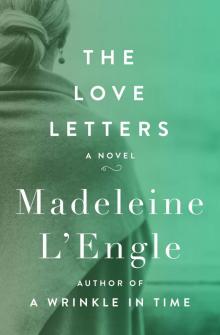 Love Letters
Love Letters The Summer of the Great-Grandmother
The Summer of the Great-Grandmother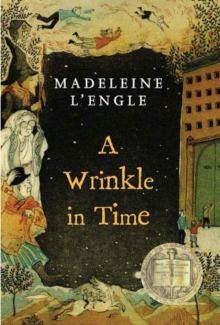 A Wrinkle in Time
A Wrinkle in Time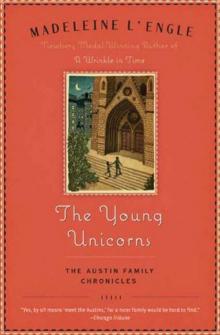 The Young Unicorns
The Young Unicorns Two-Part Invention: The Story of a Marriage
Two-Part Invention: The Story of a Marriage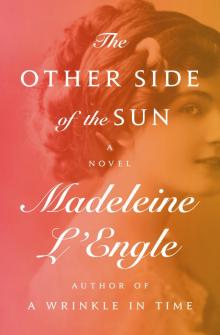 The Other Side of the Sun
The Other Side of the Sun A House Like a Lotus
A House Like a Lotus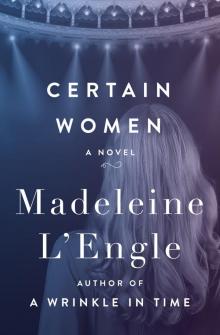 Certain Women
Certain Women Many Waters
Many Waters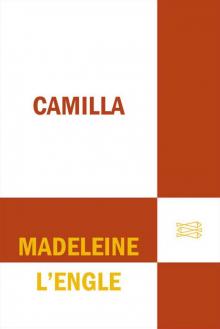 Camilla
Camilla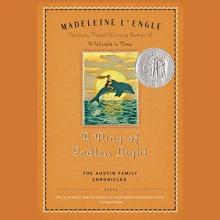 A Ring of Endless Light
A Ring of Endless Light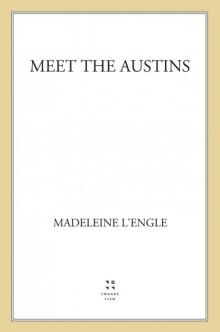 Meet the Austins
Meet the Austins Dragons in the Waters
Dragons in the Waters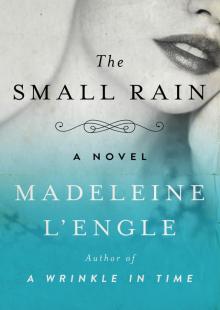 The Small Rain
The Small Rain The Moment of Tenderness
The Moment of Tenderness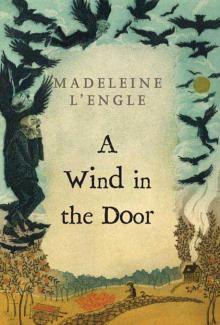 A Wind in the Door
A Wind in the Door Miracle on 10th Street
Miracle on 10th Street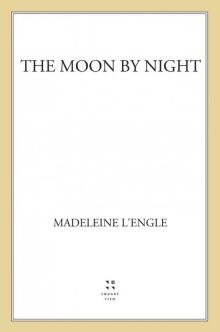 The Moon by Night
The Moon by Night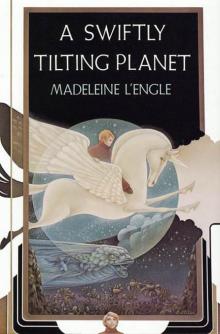 A Swiftly Tilting Planet
A Swiftly Tilting Planet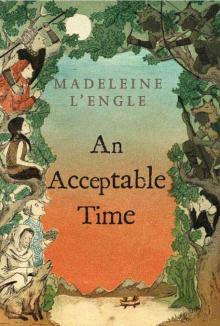 An Acceptable Time
An Acceptable Time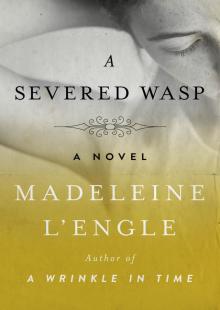 A Severed Wasp
A Severed Wasp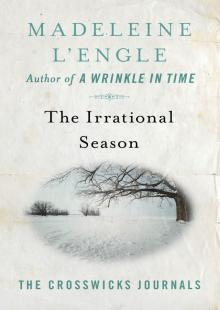 The Irrational Season
The Irrational Season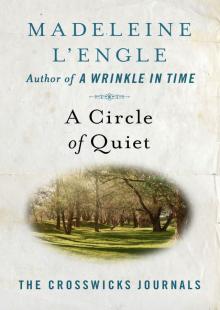 A Circle of Quiet
A Circle of Quiet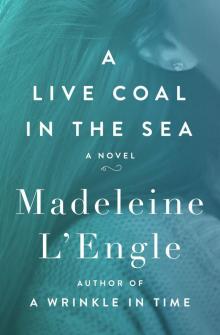 A Live Coal in the Sea
A Live Coal in the Sea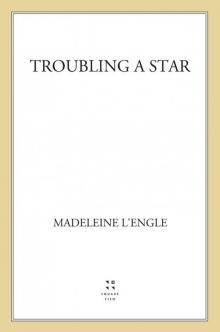 Troubling a Star
Troubling a Star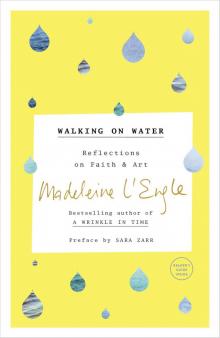 Walking on Water: Reflections on Faith and Art
Walking on Water: Reflections on Faith and Art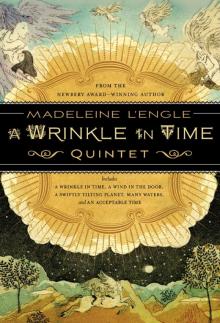 A Wrinkle in Time Quintet
A Wrinkle in Time Quintet Wrinkle in Time
Wrinkle in Time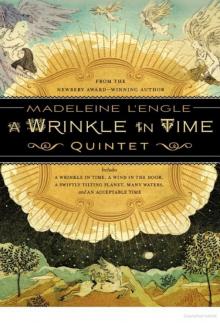 The Wrinkle in Time Quintet
The Wrinkle in Time Quintet Intergalactic P.S. 3
Intergalactic P.S. 3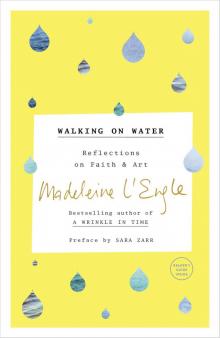 Walking on Water
Walking on Water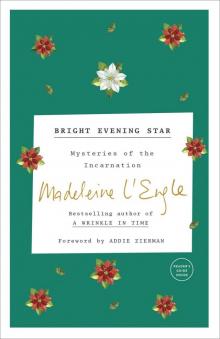 Bright Evening Star
Bright Evening Star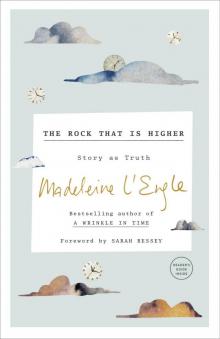 The Rock That Is Higher
The Rock That Is Higher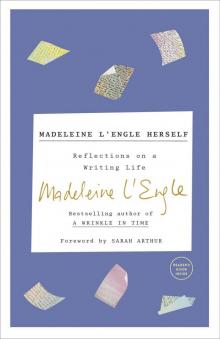 Madeleine L'Engle Herself
Madeleine L'Engle Herself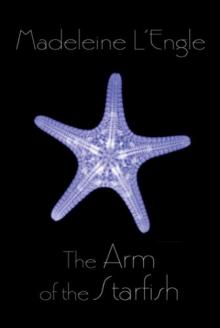 The Arm of the Starfish
The Arm of the Starfish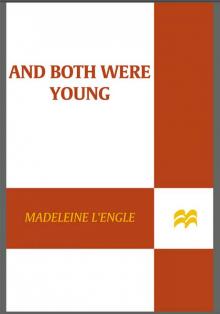 And Both Were Young
And Both Were Young The Twenty-four Days Before Christmas
The Twenty-four Days Before Christmas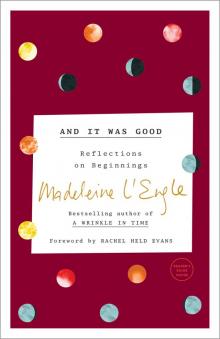 And It Was Good
And It Was Good A Stone for a Pillow
A Stone for a Pillow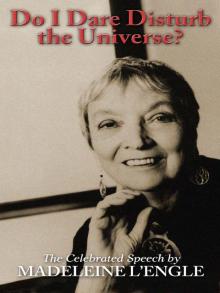 Do I Dare Disturb the Universe?
Do I Dare Disturb the Universe?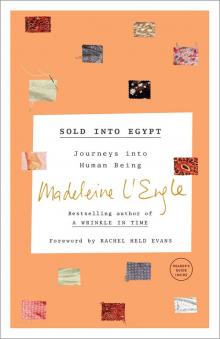 Sold into Egypt
Sold into Egypt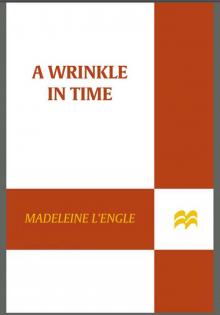 A Wrinkle in Time (Madeleine L'Engle's Time Quintet)
A Wrinkle in Time (Madeleine L'Engle's Time Quintet)